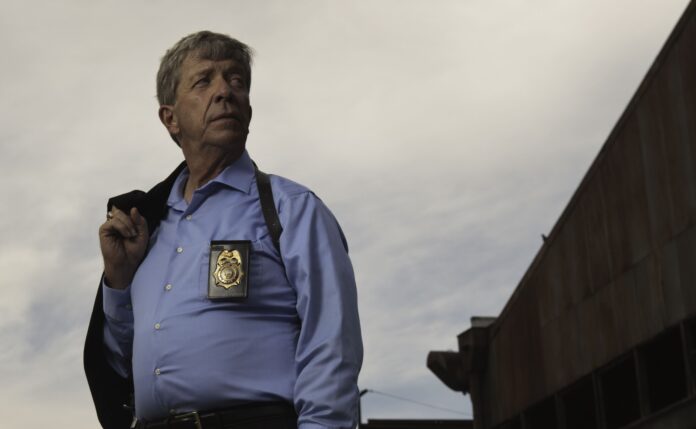
EDITOR’S NOTE: Lt. Joe Kenda, a renowned homicide detective who originally hails from Colorado Springs, and his wife, Kathy spent some time in Maricopa visiting with a friend, Alice Johnson McKinney. Kenda retired with a 92 percent success rate and has a second television show, “American Detective,” streaming on discovery+, which is in its second season. Its second season debut is Wednesday, Jan. 26.
Kenda’s first show on the ID network, “Homicide Hunter,” ran for 9 seasons.
In the second part of his interview with InMaricopa.com, Kenda talks about the highs and lows of investigating murder for a living and how it affects him to this very day:
Q: Can you explain if there was a common scenario that you ran across?
A: There’s a commonality to murder in the fact that the motivations are almost always the same: sex drugs and money. Those are the three players.
Unfortunately, the biggest common thread is narcotics. 60 percent of this country’s murders are connected to the narcotics trade, failure to pay. People who sell drugs use drugs, which is really stupid, and they get confused over who owes them money and they kill the wrong guy. The guy that’s killed isn’t the guy that owes them the money, but they forgot who owes them money. It’s bizarre, but it’s true. And they kill somebody, and they think they’re doing a revenge killing and they’re not, and it makes it very difficult. The result is you can’t connect it.
Q: Sometimes it just comes down to who you allow yourself to meet.
A: That’s true. I used to tell the public all the time the same thing. They say: ‘How can I avoid being the victim of a violent crime?’ That’s quite simple: Stay out of bars at closing time. Nothing good happens after midnight. It’s just like your mother always told you. Do not buy, sell or use narcotics or associate with those who do and try to marry well. Don’t marry a psychotic.
Q: In many states, including this one, recreation marijuana has been legalized. Does that change the dynamic?
A: No, it doesn’t change the dynamic. It doesn’t change it at all. The reason is the cartels at the moment in Mexico control most of the drug trade in the United States. It didn’t used to be true, but now it is. They move all the dope, it doesn’t matter what kind it is: brown heroin, marijuana, fentanyl, amphetamines, they do it. So, let’s say that you make the decision that the state of Arizona, and many other states have decided that while we’re going to legalize marijuana, we’re going to remove the criminality factor.
We’re going to take people, take them out of jail. Stop arresting people. Allow them to smoke marijuana, and the world will be a happy place. Well okay, so you want to reduce the cost of marijuana to encourage consumers to buy it, but if you’re a salesman of marijuana legally on the marketplace, you can’t put the money you get into an FDIC bank because it’s against the federal law to sell marijuana.
So now you need a warehouse, armed guards, bank vaults, you have hundreds of pounds of currency. What do you do with this money? Where does it go? What does it do? Who cleans the money and where does it go? All right, are you buying AK-47s for a rebel army in Africa?
You might be. But beyond that, you’re a cartel. You’re sitting back in your office in Sinaloa province in Mexico, and they say, ‘Hey they’re selling that marijuana for less money now. Yeah, well there’s a way around that. Let’s lace ours, let’s hose it down with a little methamphetamine or a little fentanyl and let’s tell them that our stuff is better than their stuff.’
It becomes a gateway drug to the other products. It isn’t designed to be one. But it becomes one.
Q: Has this business turned you into a cynic?
A: It did not. You have to understand something. While only two percent of the world engages in criminal activity, 98% of the world, goes home, pets the dog, kisses wife on the cheek, says hello to the kids, watches some TV and goes to bed and starts it all over again tomorrow. The other two percent aren’t that way. If you put up a sign in front of your driveway, that says no parking, 98% of the world won’t park there because there’s a sign.
Two percent of the world will park there because they’re special and the rules don’t apply to them. They do what they want. They kill. They steal. They rob and do whatever. If you spend 100% of your time with the world’s 2% and you forget about the existence of the 98%, then you become cynical.
I never did that. All my friends were not police officers. I dealt with other people who did other things. I had a friend who was an engineer, a guy who was a pilot, people did different things. So, you go to a party, and you’ve got something to talk about. It became interesting and produces a sense of well-being, that, you know, the world is really just okay. There are just some people who probably shouldn’t be there and it’s my job to sweep them up and put them in a garbage can, which they call the prison and that’s what I would do.
Q: There’s a lot of talk about Post Traumatic Stress Disorder (PTSD) these days. By some people, it’s self-diagnosed. But you might be the case study for it. How do you deal with the horrible things you’ve seen in your career?
A: It’s very intense work. And you don’t forget. I would love to, but I can’t forget. I have a photographic memory which is both a blessing and a curse. Mostly a curse.
I have five reoccurring nightmares involving children. Oh, they come back to visit. It’s the nature of it.
It’s never going to go away. You’re not going to forget it. It’s always going to bother you.
The best way I could describe it to you is you suddenly and unexpectedly and for no apparent reason, have a nightmare while you’re awake. It’s the weirdest thing in the world. I was watching the news one night with my wife, which I tend not to do, but she likes to watch the news and it was a nice little fluff piece about a woman that teaches kids, how to read, who don’t know how to read.
So, what kid comes on the screen? Little black kid and I saw a black kid who looked like that kid in a bad, bad incident. And when I saw that kid on the screen, it was that kid, even though it wasn’t, and I was like, I looked at my wife and told her that I had to go outside. And I went outside the house, I just stood outside for a while and got my breath back. I came back in and she said, what was that?
Q: Does the news trigger you?
A: I try to avoid the news altogether just because they only know two things, and that’s blood and failure, that’s the news. If it bleeds, it leads. I remember one day I had some television reporters tell me they needed a quote. And I responded: Alexander Pope once said that journalists are unprincipled swine, put that in your television news. They later said that Joe Kenda had no comment. I had a comment, they just didn’t like it.
Q: Do you have any coping mechanisms?
A: You just have to remember that it’s aways going to be there, knowing that in some ways is a defense. There’s no reason to apply false hope that it’s going to go away, because it isn’t.

![MHS G.O.A.T. a ‘rookie sleeper’ in NFL draft Arizona Wildcats wide receiver Jacob Cowing speaks to the press after a practice Aug. 11, 2023. [Bryan Mordt]](https://www.inmaricopa.com/wp-content/uploads/2024/04/cowing-overlay-3-218x150.png)




![Maricopa’s ‘TikTok Rizz Party,’ explained One of several flyers for a "TikTok rizz party" is taped to a door in the Maricopa Business Center along Honeycutt Road on April 23, 2024. [Monica D. Spencer]](https://www.inmaricopa.com/wp-content/uploads/2024/04/spencer-042324-tiktok-rizz-party-flyer-web-218x150.jpg)





![Alleged car thief released without charges Phoenix police stop a stolen vehicle on April 20, 2024. [Facebook]](https://www.inmaricopa.com/wp-content/uploads/2024/04/IMG_5040-218x150.jpg)

![MHS G.O.A.T. a ‘rookie sleeper’ in NFL draft Arizona Wildcats wide receiver Jacob Cowing speaks to the press after a practice Aug. 11, 2023. [Bryan Mordt]](https://www.inmaricopa.com/wp-content/uploads/2024/04/cowing-overlay-3-100x70.png)


